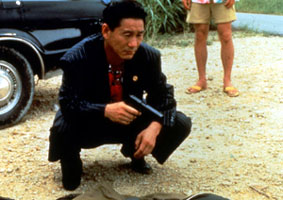Boiling Point (or 3-4 x Jûgatsu as it’s known in Japan, referring to a baseball score) is director Takeshi Kitano’s first foray into heavily experimental cinema. The film follows Masaki, who is an absolute mess of a human being. He’s on a baseball team, yet he can’t hit (let alone swing the bat properly), throw, or catch.  He rarely speaks, is quite introverted, and seems absolutely unenthused about life in general. His day job at a gas station is filled with mundane duties that he carries out in lackadaisical fashion, which is bad news for him and his bosses when he slacks off while cleaning a local Yakuza’s car. This leads to a confrontation, where Masaki finally grows a pair and stands up for himself.
He rarely speaks, is quite introverted, and seems absolutely unenthused about life in general. His day job at a gas station is filled with mundane duties that he carries out in lackadaisical fashion, which is bad news for him and his bosses when he slacks off while cleaning a local Yakuza’s car. This leads to a confrontation, where Masaki finally grows a pair and stands up for himself.
Of course he couldn’t have picked a worse person to finally stand up to, and this leads to the gang in which the man is a member of attempting to hustle money from the gas station. Masaki takes his problems to his baseball coach Iguchi, who is a reformed member of the Yakuza. Iguchi, having former times with the gang that is giving Masaki and his business pals trouble, attempts to douse the flames between them, but it only makes things worse and Iguchi is eventually beaten severely for his troubles. Wanting revenge, he sends Masaki and his friend Akira to Okinawa to obtain a gun. Once there, they have a chance meeting with an insane Yakuza outcast named Uehara, who offers to get them what they need. Unfortunately for Masaki and Akira, Uehara is out for his own style of revenge, and things quickly go from bad to worse.
While Boiling Point is only the second time Takeshi Kitano has stepped behind the camera as director, an average fan that isn’t privy to that information probably wouldn’t know otherwise, as the film is extremely accomplished. Everything is directed with a confidence that some filmmakers with countless films under their belts don’t display.  Even in his early days, Kitano wasn’t afraid to test the boundaries of his art, including a challenging narrative structure, sparse dialogue, absolutely no musical soundtrack, and holding off introducing main characters until he’s damn well ready to introduce them. He also appears to be a bit more confident in melding comedy with tense drama here than he was in his directorial debut Violent Cop, although anyone who has seen the former knows it was laced with some wicked dark humor. In Boiling Point, the darkness is certainly still there, but much of the comedy is of an absurd nature, something Kitano would explore at length in Getting Any?. In many ways, Boiling Point feels almost like a test-run for some of the avenues he would go down in that film.
Even in his early days, Kitano wasn’t afraid to test the boundaries of his art, including a challenging narrative structure, sparse dialogue, absolutely no musical soundtrack, and holding off introducing main characters until he’s damn well ready to introduce them. He also appears to be a bit more confident in melding comedy with tense drama here than he was in his directorial debut Violent Cop, although anyone who has seen the former knows it was laced with some wicked dark humor. In Boiling Point, the darkness is certainly still there, but much of the comedy is of an absurd nature, something Kitano would explore at length in Getting Any?. In many ways, Boiling Point feels almost like a test-run for some of the avenues he would go down in that film.
Kitano completely shines directorially, but his weakness at this point in his career with writing shows through. The plot of the film lacks any originality, and is as run-of-the-mill as they come. Kitano does a fine job though of covering the scripts shortcomings up through unique choices in designing the framework of the film as well as utilizing an almost hypnotizing filming style. Some may call Kitano’s techniques lazy, letting the action taking place on screen tell the story rather than using flashy camerawork, but it gives everything a serene, naturalistic feel that you rarely see in movies. Because of this, any scenes of overt violence become all the more jarring, snapping you out of any calm the film may have lulled you into.
Another element of the film that I found odd, and rather rebellious, is that the main character of Masaki is extremely unlikeable. There’s rarely a film where the character you’re  going to be following around the most is intentionally made unappealing, but that’s exactly what Kitano has done here. Masaki has no backbone, can barely do anything competently, and just stares at people whenever they talk to him. It does make for an interesting contrast with the boisterous Yakuza that he deals with, but as the main protagonist that you’re supposed to make a connection to, he’s lacking. In contrast, Kitano’s character Uehara is amazing, with tons of eccentricities and nuances throughout the brief time we spend with him. It would have been great if he was used as more of a focal point, but then that would have probably defeated the experimental goal of the film and left us with just another Yakuza flick (not that that would be a particularly bad thing.)
going to be following around the most is intentionally made unappealing, but that’s exactly what Kitano has done here. Masaki has no backbone, can barely do anything competently, and just stares at people whenever they talk to him. It does make for an interesting contrast with the boisterous Yakuza that he deals with, but as the main protagonist that you’re supposed to make a connection to, he’s lacking. In contrast, Kitano’s character Uehara is amazing, with tons of eccentricities and nuances throughout the brief time we spend with him. It would have been great if he was used as more of a focal point, but then that would have probably defeated the experimental goal of the film and left us with just another Yakuza flick (not that that would be a particularly bad thing.)
Even though Boiling Point doesn’t come together as swimmingly as some of his later work (the introspective ending really falls flat), the film still remains a fascinating look at the early years of a budding auteur, and anyone remotely interested in the films of Takeshi Kitano owes it to themselves to see it.
Second Sight’s R2 DVD release of Boiling Point is presented in 1.85:1 anamorphic widescreen, and unfortunately has some of the same issues that were present in their release of Violent Cop. This is due to the NTSC to PAL conversion, and there are definitely glaring instances of aliasing and ghosting. The frame stutter I found to be less of an issue here though than I did with Violent Cop. The audio has been remixed in Dolby Digital 5.1, and it’s surprisingly effective, with a lot of nice background effects and natural ambient sound. There are no extras on the release.
Please feel free to discuss "Boiling Point" here, in our forums!

